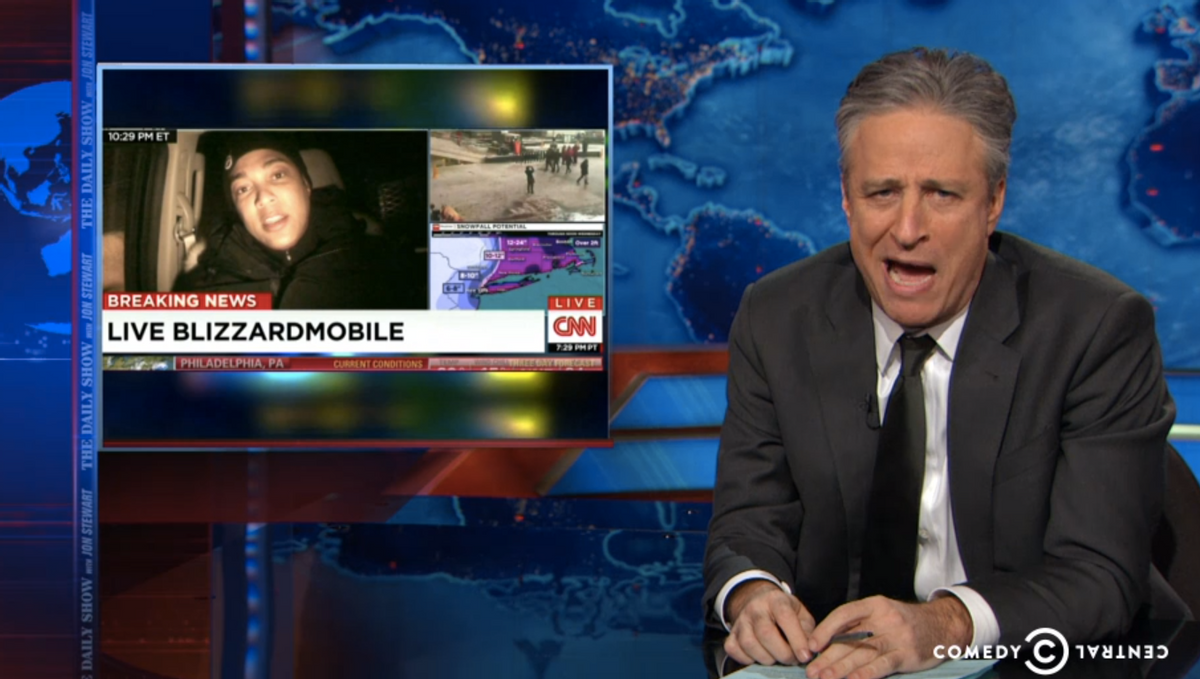You’ve probably heard the news by now that Jon Stewart is, after 16 years on the job, planning to step aside as host of “The Daily Show.” While I generally agree with Elias that his “moment” has passed and it is probably a good thing for someone newer and fresher to take over, I’m not quite so down on Stewart as he is. In fact, I think Jon Stewart gave cable television one of the most invaluable gifts the medium has ever received.
He called Tucker Carlson a dick.
There are many, many reasons why it was so important that Jon Stewart went on CNN’s “Crossfire” and called Tucker Carlson a dick. First and foremost, Tucker Carlson was, in fact, a dick, and he remains one to this day. In the immediate aftermath of Stewart calling him a dick the only question that lingered in the public consciousness is why it had taken so long for someone on Carlson’s show to state this plain and relevant fact to his face.
More significantly, in calling Tucker Carlson a dick, Jon Stewart did something that is almost unheard of in the history of cable news – he made it better. “Crossfire” was the purest expression of cable news rot: a cast of inflexibly partisan pundits who would “debate” the issues of the day by shouting their half-informed opinions past one another to the applause of a live studio audience. Stewart’s now-famous October 2004 appearance is widely credited for precipitating that horrible program’s demise less than a year later as CNN sought to change the network’s “tone.” It was a defining moment for the concept of addition-by-subtraction.
What I’ve appreciated most about Jon Stewart’s tenure as host of “The Daily Show” has been his steady, unwavering commitment to picking apart the many qualities that make cable news a largely unwatchable blight upon American public discourse. I first got into media criticism and politics from watching “The Daily Show” in the early 2000s and absorbing its on-point mockery of cable news’ most offensive tropes. The recurring “Even Stevphen” segment, which featured Steve Carrell and Stephen Colbert debating issues of weighty importance by yelling at and insulting one another until one of them broke down in tears, was inspired television.
No one else was really doing anything like this at the time, and certainly nobody else did it so well. And cable news was a fat target given the obvious difficulties it had – and still has – in filling 24 hours of each day with compelling programming that is profitable. When it’s not being actively pernicious, cable news often slips into lazy absurdity, and you can become desensitized to it through constant exposure. Stewart and his crew have become masters at hunting down those strange, awkward, gotta-fill-the-hour moments and isolating them to reveal just how vacant these institutions of broadcast journalism often are.
Conor Friedersdorf argues that whoever takes over for Stewart should not carry on his legacy of flensing CNN and the rest of cable news as often as they deserve it, and he makes a good case – “The Daily Show” perfected cable news mockery, but after so many years the point has been made more than enough. But it’s still fun to watch, and that mockery is still necessary given that the networks show no intention of improving on their own. And Jon Stewart demonstrated that you can actually produce results from time to time, just so long as someone is willing to call out those dicks.



Shares